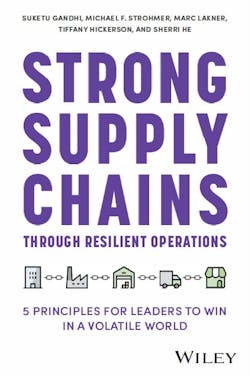Recognizing the need for guidance in a volatile business landscape, Suketu Gandhi, Michael Strohmer, Marc Lakner, Tiffany Hickerson and Sherri He set out to fill some gaps. Their book, published last month by Wiley, introduces five key principles for operational transformation, addressing challenges like siloed thinking and providing practical case studies.
Chemical Processing queried the authors, who are all consultants at Kearney, on the concepts and expectations of the book.
What was the motivation to write this book?
In working with our clients, we noticed that while most of them agreed that the old paradigms of operations management did not work anymore in the volatile “new normal” and that they had to rethink their operations and supply-chain strategy, many of them lacked guidance on what the target state should be, or where to start.
What are some of the fundamental concepts readers can expect to learn from this book?
We discuss the need for operations transformations based on five principles: how to work with the supplier, how to operate for the customer, how to empower talent, how to leverage technology and how to embrace sustainability. While every transformation is unique, these five principles are—in varying intensity—part of each transformation that we as consultants have supported. While the principles themselves are discussed as strategic concepts, we also define five exemplary and actionable approaches within each principle that our readers can start to implement in their day-to-day operations to kick off their transformation.
Can you highlight any challenging topics that your book addresses?
The book addresses one of the major challenges most, if not all, manufacturing companies face: siloed thinking. Often, functions try to optimize their KPIs locally, as that is what they are incentivized to do. As a result, firms lose out on value from their operations. In our book, we make a strong case for end-to-end alignment and optimization through a holistic operations strategy. This is easier said than done because it means breaking open silos, making difficult trade-off decisions and changing the underlying paradigms and culture.
Were there any specific gaps in existing resources that you aimed to fill with your book?
We noticed that while there’s a wide range of books available focusing on specific functions or challenges, there was a lack of holistic perspectives on what operations leaders and their teams should be doing to stay competitive in a business environment this volatile.
Please share any practical examples or case studies that readers might find valuable.
We have enriched the book with many real-life case studies taken from our experience as consultants to make it more enjoyable and tangible for the reader. One particularly interesting case study for operators and engineers in the chemical industry is one of the main case studies on sustainability, where we explore how the need to comply with sustainability regulations in the chemical industry can help players rethink their operations and become more resilient and efficient.
Apart from your book, what other resources or references do you recommend to readers who want to continue learning about this topic?
We have a big collection of related articles and insights available at the Kearney Supply Chain Institute. Readers who want to deep-dive into the macroeconomic drivers of operations transformations can look to our Kearney think tank, the Global Business Policy Council.
Have you received any feedback from readers or professionals in the field about how your book has helped them?
We have talked to a selection of CXOs from different geographies and industries who received a sneak peek and were asked for feedback. They loved it! Their endorsements are now printed on the book cover as short statements. Furthermore, we were able to hit No. 1 in the “new releases” category of Amazon in the field of manufacturing. It’s a humbling experience to see that we have really hit a nerve with our book.
What impact do you hope your book will have on readers?
We hope that the book will help readers learn something about operations and supply chains—both on a strategic and day-to-day level. We intend this book both for seasoned operations leaders and veterans who have noticed that their old recipes for success are not working as well anymore and are looking for something new, and for newcomers to the field of operations, people who have noticed the emergence of resilient operations in a volatile world.
Check out "Strong Supply Chains Through Resilient Operations"




